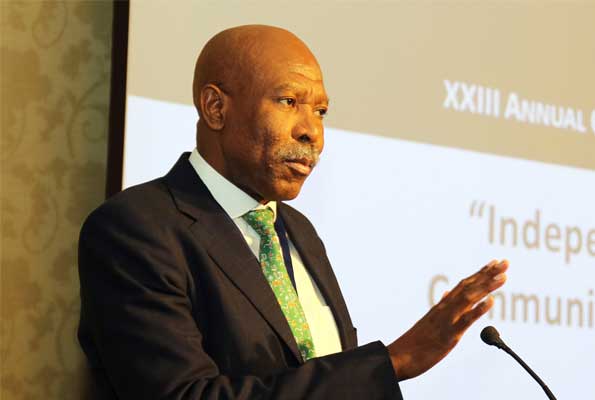For the first time since November 2021, South Africa has decided to hold its interest rate. However, South African Reserve Bank’s Governor Lesetja Kganyago believes that the rate hike pause did not mean an end to the monetary policy revision cycle.
The South African Reserve Bank’s (SARB) monetary policy committee (MPC) has kept its interest rates at 8.25% as the latest inflation forecasts came in a lower range than the previous ones and the overall economic conditions improved. However, Lesetja Kganyago informed the media that future rate decisions would continue to depend on economic data and risks to the inflation outlook.
“Have interest rates peaked? The answer is a resounding no,” said Lesetja Kganyago at a press conference.
“Is this the end of the hiking cycle? No, it is not. It depends on the data and risks, that is what it boils down to,” the senior official added further.
South Africa’s consumer inflation fell within the SARB’s target range of between 3% and 6% for the first time in 14 months in June 2023, the latest government data showed.
The rand fell in the aftermath of the latest rate decision, with the central bank now projecting the domestic inflation to average at 6.0% in 2023 compared with a 6.2% forecast in May.
SARB is also expecting the overall inflation to fall back to the midpoint of the target range sustainably only by the third quarter of 2025. At the same point in time, South Africa’s GDP growth is forecast at 0.4% in 2023, revised up slightly from 0.3%.
“South Africa’s economic conditions appear to have improved,” the bank said in its monetary policy committee statement, while cautioning that the longer-term outlook remained uncertain amid ongoing power cuts, logistical bottlenecks and sustained food price pressures pose a risk to inflation.
Jason Tuvey, deputy chief emerging markets economist at Capital Economics, said in a note that rate cuts were likely to materialise only in early 2024.
“The split vote suggests that inflation concerns continue to linger and it is likely to take some time before a majority on the MPC are in favour of rate cuts,” Tuvey said.
Three members of the MPC preferred to keep rates on hold and two preferred a 25 basis points hike. Deputy Governor Kuben Naidoo informed the media a rate cut was not discussed at the July 2023 meeting.
South Africa’s economy grew by 0.4% between January and March of 2023. Crippling power cuts, volatile commodity prices and a challenging external environment have contributed to the country’s weak growth performance, noted IMF African Department.
“By year-end, we project real GDP growth to fall sharply from last year. Though we expect growth to pick up again in 2024, the pace is too slow to reduce unemployment, which at 32.9 per cent remains close to an all-time high,” the think tank said.
“The country has faced rolling blackouts after years of mismanagement of the state-owned utility, Eskom, prompting the authorities to ease the registration process and licensing requirements for energy production to encourage private sector investment. The government also announced a three-year debt relief arrangement to help Eskom establish its commercial viability and mitigate the energy crisis,” the IMF African Department remarked further in its recent study.
The think tank has also stated that additional far-reaching reforms were needed to achieve job-rich, inclusive, and greener growth. The country also needs to work on its energy and logistical constraints, apart from reducing barriers to private sector investment, addressing structural rigidities in the labour market, and tackling crime and corruption.
“Like elsewhere, persistently high food and energy prices have pushed up inflation and raised inflation expectations. Monetary policy normalization should continue to keep inflation expectations anchored and bring down headline inflation to the midpoint of the South African Reserve Bank’s 3–6% target range,” the report concluded.



